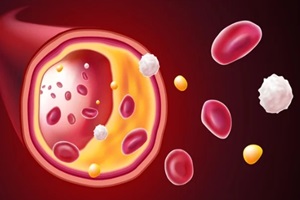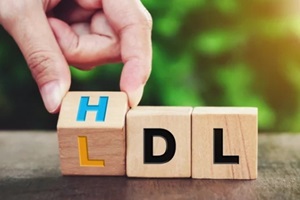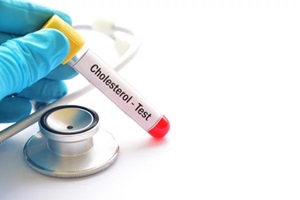 If you’ve ever gotten back bloodwork showing high cholesterol, you may feel confused about what that means and what to do next. With heart disease remaining a leading health threat, cholesterol levels draw plenty of attention.
If you’ve ever gotten back bloodwork showing high cholesterol, you may feel confused about what that means and what to do next. With heart disease remaining a leading health threat, cholesterol levels draw plenty of attention.
However, a growing body of research reveals that dietary cholesterol itself makes up just one piece of a complex puzzle.
The Role of Genetics
Genes play a significant role when it comes to high cholesterol levels. If one or both of your parents have struggled with high cholesterol, you are predisposed to facing similar issues.
Specific gene variants that affect cholesterol regulation get passed down in families. These variants influence how your body produces cholesterol in the liver, processes it through the bloodstream, and eliminates excess amounts.
Someone who inherits gene mutations hampering cholesterol clearance may need to work harder through diet, exercise, and possibly medication to maintain ideal levels.
Genetics help explain why some people eating similar diets and living comparable lifestyles have markedly different cholesterol test results.
One rare genetic condition, called familial hypercholesterolemia, provides an extreme example. People born with one of around 1,500 gene mutations causing this disorder have high cholesterol from birth, which typically continues increasing throughout life unless treated.
Even close relatives without the precise mutation may still battle high cholesterol more often when familial hypercholesterolemia runs in the family.
Other Diet Factors Have an Effect Too
Saturated fat and trans fat tend to raise LDL or “bad” cholesterol more than dietary cholesterol itself does. Losing extra pounds can also help lower cholesterol numbers. Adding viscous fiber from oats, legumes, and certain fruits and vegetables also lowers cholesterol absorption in the gut for some people.
So, while headlines often focus on dietary cholesterol found in animal foods such as meat, dairy, eggs, and shrimp, other parts of your eating pattern likely have more significant effects on your cholesterol risk profile.
Your Cholesterol Type Also Matters
It’s not just the total cholesterol result that counts. Doctors look separately at low-density lipoproteins (LDL) and high-density lipoproteins (HDL) carrying cholesterol throughout your bloodstream.
Research now shows HDL benefits your cardiovascular and overall health in many ways beyond shuttling excess cholesterol back to the liver for processing. Higher HDL levels generally prove protective for heart health.
Meanwhile, LDL particles that become oxidized and damaged penetrate artery walls more easily, spurring plaque buildup.
For any given total cholesterol number, the ratio of HDL to LDL offers important insights into the likelihood of heart disease. Diet and lifestyle not only influence the total number but also impact the type of cholesterol you have.
Foods High in Cholesterol: Any Cause for Concern?
 In the past, nutrition experts highlighted animal foods naturally high in cholesterol as ones to avoid, including eggs and shrimp. However, large reviews of population research found that eating one whole egg daily does not increase cardiovascular issues or mortality.
In the past, nutrition experts highlighted animal foods naturally high in cholesterol as ones to avoid, including eggs and shrimp. However, large reviews of population research found that eating one whole egg daily does not increase cardiovascular issues or mortality.
Shrimp packs high cholesterol counts into a relatively small serving, but three ounces of shrimp daily did not adversely affect lipid results in one study.
Rather than single out particular foods, your overall dietary pattern and calorie balance probably matter more for managing cholesterol over the long run.
For most healthy people, incorporating eggs and occasional shellfish into a diet loaded with fruits, vegetables, whole grains, legumes, nuts, seeds, and lean protein sources should pose little concern.
Where Does Your Body’s Cholesterol Come From?
The body’s liver provides about 1,000 mg of cholesterol each day. Your physiology works hard to keep blood cholesterol levels in a narrow range no matter what you eat.
When you take in ample cholesterol from food sources, your liver generally downregulates its own production. However, in certain genetic conditions, cholesterol overproduction happens internally, sometimes leading to seriously elevated blood levels.
Dietary intake becomes just one contributor to the total equation. Ongoing research explores genes that might predispose some people to over-respond to dietary cholesterol intake with spikes in blood cholesterol counts.
As testing and knowledge of such gene variants improves in the future, more personalized nutrition advice may emerge.
What Cholesterol Challenge Tests Reveal
For decades, scientists studied people’s responses to severely restricting cholesterol intake in very low-carb diets before reintroducing it.
They found about one-quarter of people are “hyper-responders” who see significant jumps in LDL cholesterol with added cholesterol intake, while others’ levels stay stable.
However, experts debate the value of long-term adherence to such extremely limited diets. Newer research focuses more on LDL function versus only LDL concentration. Plus, genetics likely affect who responds dramatically.
Context still matters, too — by eating well-balanced diets with reasonable amounts of saturated fat, trans fat, refined carbohydrates, and calories, even hyper-responders may handle typical intake levels without seeing spikes.
Ongoing Exploration to Fill Knowledge Gaps
Experts continue investigating how substances interacting with cholesterol, such as plant sterols, soy protein, soluble fiber, and niacin, influence cardiovascular disease risks and quantitative markers.
One area involves interactions between cholesterol pathways and processes such as immunity and inflammation. For example, investigators hypothesize that LDL oxidation that enables plaque buildup is connected with chronic low-level inflammation.
Your microbiome — the collection of trillions of bacteria inhabiting your intestines — also connects with cholesterol levels in ways scientists have only begun to understand.
 Ultimately, cholesterol regulation in your body is likely closely connected with numerous other systems that are essential for your health. While much is still unknown, rapid progress in research should reveal key insights in the coming years.
Ultimately, cholesterol regulation in your body is likely closely connected with numerous other systems that are essential for your health. While much is still unknown, rapid progress in research should reveal key insights in the coming years.
Imperial Center Family Medicine: Your Guide for Cholesterol Care
If you feel confused navigating your cholesterol results or recommendations, Imperial Center Family Medicine’s expert providers can help.
We’ll work with you to help you understand your genetic predispositions, dietary pitfalls, and lifestyle risk factors influencing your cholesterol status.
We take time to explain what your lipid panel means and create an individualized plan to help you maintain long-term heart wellness. Contact us today at 919-873-4437 or online to take control of your cholesterol care.
